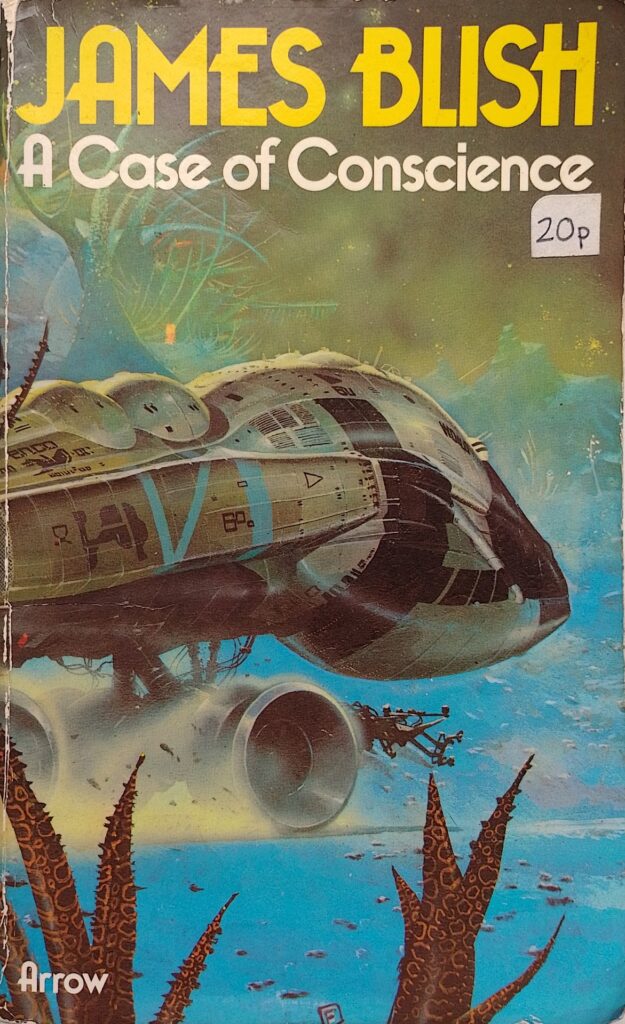First published 1958. Arrow paperback, 1979, pp 208, c.73,000 words.
This is surely unique amongst golden-age science fiction in being concerned with Roman Catholic doctrine. There was considerable interest in literary fiction in the subject at that time, in the novels of Graham Greene and Evelyn Waugh for example. Blish opens his foreword with: ‘This novel is not about Catholicism.’ Later in the same paragraph he writes: ‘Readers who have no doctrinal preconceptions should not find these points even noticeable, let alone troublesome.’ [p5] The rest of the foreword then goes on to defend his exploration of Catholicism in the book, and this reader, who doesn’t have much in the way of doctrinal preconceptions, certainly did notice and was troubled by them. It is a highly original theme: how will a devout Jesuit respond to meeting an alien race? How can they fit into the Catholic perception of God’s scheme?
The book opens with a team of four scientists, one of whom, Ruiz-Sanchez, is the Jesuit, exploring a planet, Lithia, recently discovered by humans that is occupied by an intelligent species of human-sized lizard-like creatures. The team is report back on what sort of relationship Earth should have with the planet: should it be exploited for its natural wealth, treated as a friendly neighbour and port of call, or ignored? Opinions are divided amongst the team.
Blish establishes a credible and unique culture for the Lithians. In some respect they are technologically backward: having little iron they have not discovered electricity, but they have discovered static electricity and developed some technologies that are more advanced than those of humans [p16]. They have a type of GPS [p23]. Morally, the Lithians seem to be perfect, living in a paradise untroubled by conflict. The whole planet seems to share the same culture and language. Biologically, the Lithinas have a reproductive system that is akin to turtles. Mothers discharge their large number of fertilised eggs into the sea. The creatures undergo several metamorphoses before reaching adulthood, and the survival rate of the young is very low. Parents are indifferent to and don’t recognise their offspring.
On leaving the planet, Ruiz-Sanchez is presented with a Lithian egg. The scientists return to Earth and present their report. One of them sets up a lab to hatch the egg…
Earth itself has moved on. The threat of nuclear war has driven the population into vast underground cities where resentment seethes. There is still an endless struggle between political factions.
It’s always fun to spot the ways the vision of the future presented in SF novels has diverged from the present. One of the characters says ‘I don’t hold with women in the sciences.’ [p13], and this is supposed to be 2049. Letters may still be hand written and mailed, although delivered by inter-continental missile. [p151]. Italy uses the Lira. Adolescent gangs use ‘power scooters’ [p135] which seems spot-on. Either there has been a merging of Chinese and Japanese cultures by 2049, or Blish’s awareness of the difference was sketchy: Dr Liu Meid runs the laboratory where the Lithian egg is to be raised. She is described as being ‘small-boned and intensely nubile as a geisha’ and ‘Inside her soft colours, she was a Venus Callipygous’ [p101], which as well as being sexist seems to misunderstand the typical geisha. Despite her Chinese-American name she speaks Japanese [p105]. The moon is dusty [p194], as was then thought – see for example Arthur C. Clarke’s A Fall of Moondust.
This is a well written and original story that explores deep themes. There is a certain resonance with populist politicians of the current age exploiting the air of dissatisfaction felt by many. However I did feel that I missed a dimension in having little understanding of Catholic doctrine. The Wikipedia summary of the book is enlightening but contains complete plot spoilers. No doubt Blish has a hugely fertile imagination and was an able writer.
Wikipedia biography of Blish: https://en.wikipedia.org/wiki/James_Blish
Wikipedia summary of the book: https://en.wikipedia.org/wiki/A_Case_of_Conscience
Others’ reviews of the book: https://www.goodreads.com/book/show/123673.A_Case_of_Conscience?ref=nav_sb_ss_1_18
© William John Graham, September 2023

